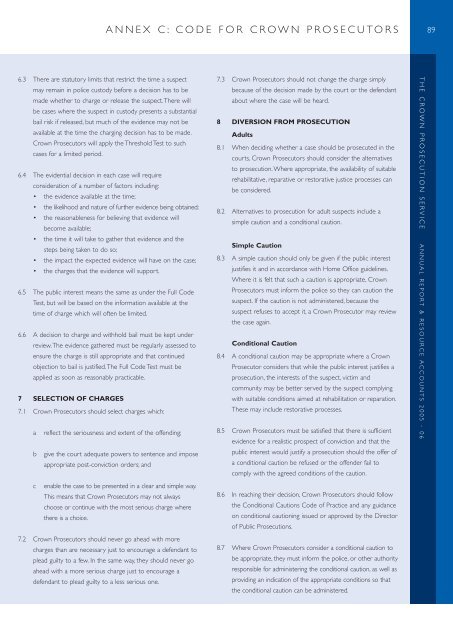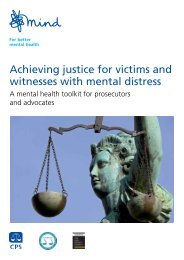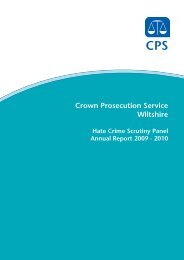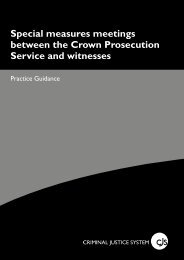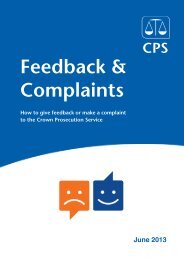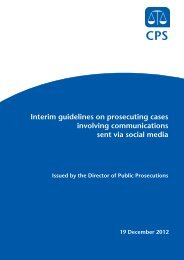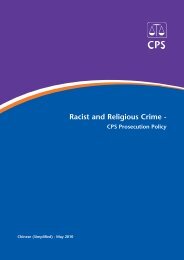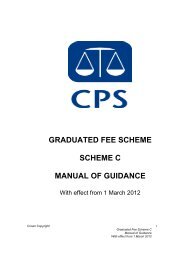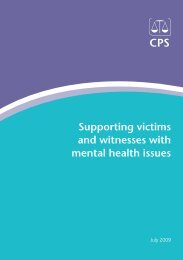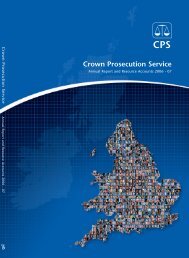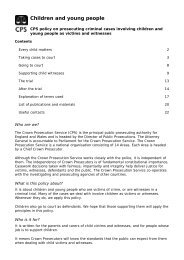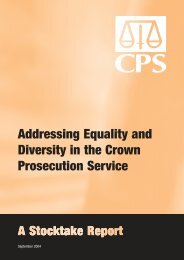CPS Annual Report 2005-2006 - PDF - Crown Prosecution Service
CPS Annual Report 2005-2006 - PDF - Crown Prosecution Service
CPS Annual Report 2005-2006 - PDF - Crown Prosecution Service
You also want an ePaper? Increase the reach of your titles
YUMPU automatically turns print PDFs into web optimized ePapers that Google loves.
ANNEX C: CODE FOR CROWN PROSECUTORS 89<br />
6.3 There are statutory limits that restrict the time a suspect<br />
may remain in police custody before a decision has to be<br />
made whether to charge or release the suspect.There will<br />
be cases where the suspect in custody presents a substantial<br />
bail risk if released, but much of the evidence may not be<br />
available at the time the charging decision has to be made.<br />
<strong>Crown</strong> Prosecutors will apply the Threshold Test to such<br />
cases for a limited period.<br />
6.4 The evidential decision in each case will require<br />
consideration of a number of factors including:<br />
• the evidence available at the time;<br />
• the likelihood and nature of further evidence being obtained;<br />
• the reasonableness for believing that evidence will<br />
become available;<br />
• the time it will take to gather that evidence and the<br />
steps being taken to do so;<br />
• the impact the expected evidence will have on the case;<br />
• the charges that the evidence will support.<br />
6.5 The public interest means the same as under the Full Code<br />
Test, but will be based on the information available at the<br />
time of charge which will often be limited.<br />
6.6 A decision to charge and withhold bail must be kept under<br />
review.The evidence gathered must be regularly assessed to<br />
ensure the charge is still appropriate and that continued<br />
objection to bail is justified.The Full Code Test must be<br />
applied as soon as reasonably practicable.<br />
7 SELECTION OF CHARGES<br />
7.1 <strong>Crown</strong> Prosecutors should select charges which:<br />
a reflect the seriousness and extent of the offending;<br />
b give the court adequate powers to sentence and impose<br />
appropriate post-conviction orders; and<br />
c enable the case to be presented in a clear and simple way.<br />
This means that <strong>Crown</strong> Prosecutors may not always<br />
choose or continue with the most serious charge where<br />
there is a choice.<br />
7.2 <strong>Crown</strong> Prosecutors should never go ahead with more<br />
charges than are necessary just to encourage a defendant to<br />
plead guilty to a few. In the same way, they should never go<br />
ahead with a more serious charge just to encourage a<br />
defendant to plead guilty to a less serious one.<br />
7.3 <strong>Crown</strong> Prosecutors should not change the charge simply<br />
because of the decision made by the court or the defendant<br />
about where the case will be heard.<br />
8 DIVERSION FROM PROSECUTION<br />
Adults<br />
8.1 When deciding whether a case should be prosecuted in the<br />
courts, <strong>Crown</strong> Prosecutors should consider the alternatives<br />
to prosecution. Where appropriate, the availability of suitable<br />
rehabilitative, reparative or restorative justice processes can<br />
be considered.<br />
8.2 Alternatives to prosecution for adult suspects include a<br />
simple caution and a conditional caution.<br />
Simple Caution<br />
8.3 A simple caution should only be given if the public interest<br />
justifies it and in accordance with Home Office guidelines.<br />
Where it is felt that such a caution is appropriate, <strong>Crown</strong><br />
Prosecutors must inform the police so they can caution the<br />
suspect. If the caution is not administered, because the<br />
suspect refuses to accept it, a <strong>Crown</strong> Prosecutor may review<br />
the case again.<br />
Conditional Caution<br />
8.4 A conditional caution may be appropriate where a <strong>Crown</strong><br />
Prosecutor considers that while the public interest justifies a<br />
prosecution, the interests of the suspect, victim and<br />
community may be better served by the suspect complying<br />
with suitable conditions aimed at rehabilitation or reparation.<br />
These may include restorative processes.<br />
8.5 <strong>Crown</strong> Prosecutors must be satisfied that there is sufficient<br />
evidence for a realistic prospect of conviction and that the<br />
public interest would justify a prosecution should the offer of<br />
a conditional caution be refused or the offender fail to<br />
comply with the agreed conditions of the caution.<br />
8.6 In reaching their decision, <strong>Crown</strong> Prosecutors should follow<br />
the Conditional Cautions Code of Practice and any guidance<br />
on conditional cautioning issued or approved by the Director<br />
of Public <strong>Prosecution</strong>s.<br />
8.7 Where <strong>Crown</strong> Prosecutors consider a conditional caution to<br />
be appropriate, they must inform the police, or other authority<br />
responsible for administering the conditional caution, as well as<br />
providing an indication of the appropriate conditions so that<br />
the conditional caution can be administered.<br />
THE CROWN PROSECUTION SERVICE ANNUAL REPORT & RESOURCE ACCOUNTS <strong>2005</strong> - 06


